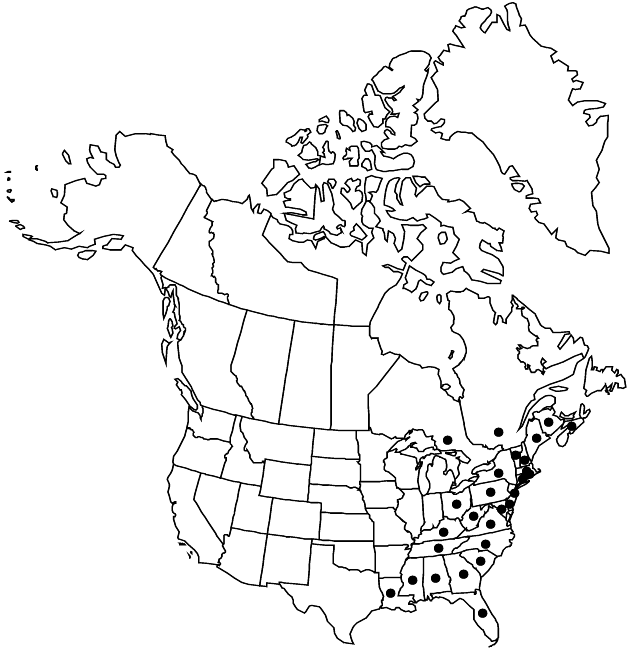Difference between revisions of "Solidago puberula"
Gen. N. Amer. Pl. 2: 162. 1818.
FNA>Volume Importer |
imported>Volume Importer |
||
| Line 8: | Line 8: | ||
}} | }} | ||
|common_names=Downy goldenrod;verge d’or pubérulente | |common_names=Downy goldenrod;verge d’or pubérulente | ||
| + | |special_status={{Treatment/ID/Special_status | ||
| + | |code=E | ||
| + | |label=Endemic | ||
| + | }} | ||
|basionyms= | |basionyms= | ||
|synonyms= | |synonyms= | ||
| Line 20: | Line 24: | ||
-->{{Treatment/Body | -->{{Treatment/Body | ||
| − | |distribution= | + | |distribution=N.B.;N.S.;Ont.;Que.;Ala.;Conn.;Del.;Fla.;Ga.;Ky.;La.;Maine;Mass.;Md.;Miss.;N.C.;N.H.;N.J.;N.Y.;Ohio;Pa.;R.I.;S.C.;Tenn.;Va.;Vt.;W.Va. |
|discussion=<p>Subspecies 2 (2 in the flora).</p> | |discussion=<p>Subspecies 2 (2 in the flora).</p> | ||
|tables= | |tables= | ||
| Line 50: | Line 54: | ||
|basionyms= | |basionyms= | ||
|family=Asteraceae | |family=Asteraceae | ||
| − | |distribution= | + | |distribution=N.B.;N.S.;Ont.;Que.;Ala.;Conn.;Del.;Fla.;Ga.;Ky.;La.;Maine;Mass.;Md.;Miss.;N.C.;N.H.;N.J.;N.Y.;Ohio;Pa.;R.I.;S.C.;Tenn.;Va.;Vt.;W.Va. |
|reference=None | |reference=None | ||
|publication title=Gen. N. Amer. Pl. | |publication title=Gen. N. Amer. Pl. | ||
|publication year=1818 | |publication year=1818 | ||
| − | |special status= | + | |special status=Endemic |
| − | |source xml=https:// | + | |source xml=https://bibilujan@bitbucket.org/aafc-mbb/fna-data-curation.git/src/bb6b7e3a7de7d3b7888a1ad48c7fd8f5c722d8d6/coarse_grained_fna_xml/V19-20-21/V20_240.xml |
|tribe=Asteraceae tribe Astereae | |tribe=Asteraceae tribe Astereae | ||
|genus=Solidago | |genus=Solidago | ||
Revision as of 20:47, 27 May 2020
Plants 20–100 cm; caudices branched, woody. Stems 1–5+, erect, puberulent. Leaves: basal and proximal cauline tapering to long petioles, blades oblanceolate to obovate, 50–150 × 10–50 mm, margins serrate, apices acute, faces puberulent; mid to distal cauline sessile, blades lanceolate to linear-elliptic, 10–50 × 3–10 mm, reduced distally, margins becoming entire, apices acute. Heads 15–250, not secund, in elongate, paniculiform arrays, lateral racemiform clusters short and ascending, sometimes lateral branches elongated and sharply ascending. Peduncles 1.5–3 mm. Involucres campanulate, 3–5 mm. Phyllaries in 3–4 series, appressed, unequal, linear, attenuate, puberulent. Ray florets 9–16 (orange-yellow); laminae 3.5–4.2 × 0.4–0.6 mm. Disc florets (6–)10–15; corollas 2.8–3 mm, lobes 0.5–0.8 mm. Cypselae 0.8–1.3 mm, glabrous or sparsely strigose; pappi 2.2–2.6 mm.
Distribution

N.B., N.S., Ont., Que., Ala., Conn., Del., Fla., Ga., Ky., La., Maine, Mass., Md., Miss., N.C., N.H., N.J., N.Y., Ohio, Pa., R.I., S.C., Tenn., Va., Vt., W.Va.
Discussion
Subspecies 2 (2 in the flora).
Selected References
None.
Key
| 1 | Leaves 20–50(–60), mid cauline usually 40–50 mm; phyllaries attenuate; Nova Scotia to Ontario, s to piedmont and mountains in Georgia | Solidago puberula subsp. puberula |
| 1 | Leaves (20–)50–110+, mid cauline 10–40 mm; phyllaries acute to barely attenuate; coastal plain, se Virginia to n Florida, w to e Louisiana | Solidago puberula subsp. pulverulenta |